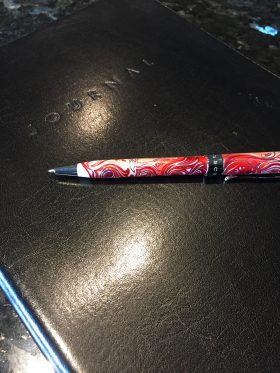 Making choices: Why do we find it so challenging?
Making choices: Why do we find it so challenging?
I originally wrote this piece in my journal, long-hand. I let the words flow from my pen, and was so fascinated by the story that emerged, I decided to type it up and reproduce it for you today.
Dear Journal
I’ve changed my pen today, putting down my green/gold Cross pen to write instead with my red/silver Cross pen. You may argue that it’s not much of the change – both are ball point pens, both are filled with black ink and both are the same weight. Yet they feel different. This pen has a medium writing point, the other has my preferred fine point. This pen still looks new and shiny, despite being older, while the other is smooth through regular use.
My motivation to change pens today is curiosity. My green/gold pen sometimes fails to write in this journal, just occasionally, close to the binding. I want to see if the issue is with my journal or with my pen, as this isn’t the first journal in which I’ve had this problem.
But now, rather than feeling curious, I feel uncomfortable and find myself wanting to change back to my old pen. I realise, once more, just how challenging it can be to move away from the familiar, even to something just marginally different. My decision to change pens was relatively passive, and now I feel resistance and find myself having to make an active choice to stay with this pen; I am needing to invest a level of energy that I didn’t expect to expend this morning.
On the surface, there is little difference between my pens; the choice shouldn’t be that challenging. Rationally, this is true. But emotionally, the two pens feel as if they are miles apart and the distance between them is long and challenging.
As I write this, I become aware of a story emerging. My green/gold pen was a gift from work colleagues whilst my red/silver pen was a gift from my ex-husband. When I choose to write with my favourite pen, I have memories of working with my colleagues and the evening they presented me with this pen set as a leaving gift; what emerges as I use my red/silver pen is a story that I’d prefer to avoid.
Each choice we make, each decision, has its own story. There are elements of the story that we know well and recognise easily – I prefer fine-point pens over medium-point pens as I think my writing looks better. But there may be elements of the story that we are not consciously aware of and that we only get to know through our, sometimes surprising, emotional response to the decision.
To proactively choose to do something different, we may have to let the story that sits behind our emotional response emerge. In this way, we can identify how much emotional energy we will need to make the choice stick. For some choices, we may uncover our inner motivation; for others, we may discover why it is that we’d prefer to reverse our decision and return to the status quo. By exploring the story behind our feelings, we gain insights that help us stay with our initial choice or give us good and active reasons to change our path.
So, I write with my red/silver Cross pen and this whole piece emerges, unsought, meaningful and full of insight. And in the process, some of the ghosts residing in my red/silver pen dispel and I relax into my writing with an open heart
Change, no matter how slight, teaches us and opens the door to deeper understanding and, in turn, to even more choices.
As a coach, I feel deeply honoured that my clients are willing to share their stories with me. I often get to see the impact that exploring these stories can have on their choices – a deeper understanding as to why, new insights into repeated patterns of unproductive behaviour and even a few ghosts dispelled.
Those who do not have power over the story that dominates their lives, power to retell it, to rethink it, deconstruct it, joke about it, and change it as times change, truly are powerless, because they cannot think new thoughts.
Salman Rushdie